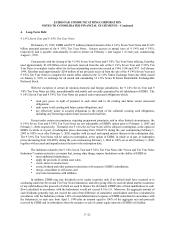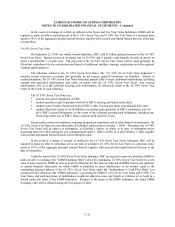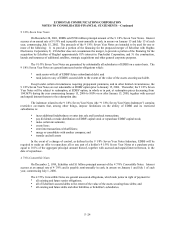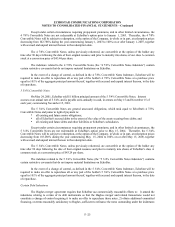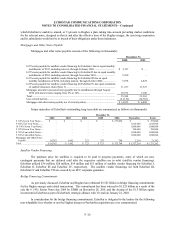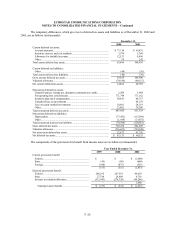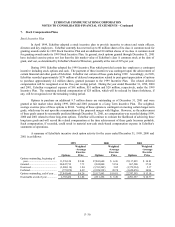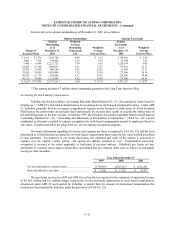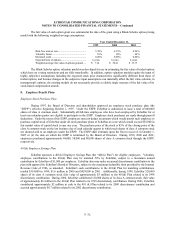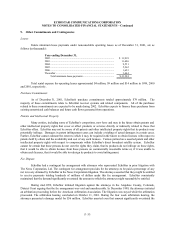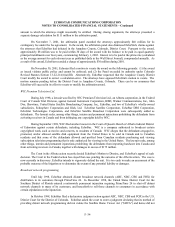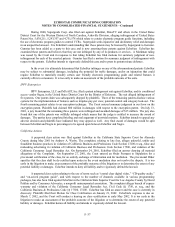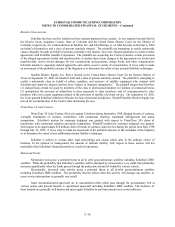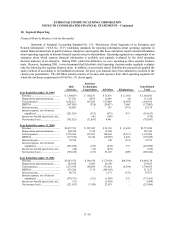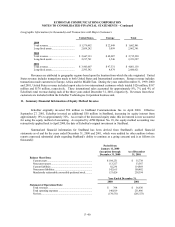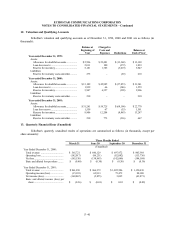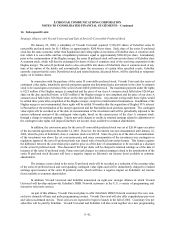Dish Network 2001 Annual Report Download - page 97
Download and view the complete annual report
Please find page 97 of the 2001 Dish Network annual report below. You can navigate through the pages in the report by either clicking on the pages listed below, or by using the keyword search tool below to find specific information within the annual report.
ECHOSTAR COMMUNICATIONS CORPORATION
NOTES TO CONSOLIDATED FINANCIAL STATEMENTS – Continued
F–32
The fair value of each option grant was estimated at the date of the grant using a Black-Scholes option pricing
model with the following weighted-average assumptions:
Year Ended December 31,
1999 2000 2001
Risk-free interest rate......................................... 5.38% 6.19% 4.94%
Volatility factor ................................................. 76% 98% 64%
Dividend yield................................................... 0.00% 0.00% 0.00%
Expected term of options..................................... 6 years 6 years 6 years
Weighted-average fair value of options granted .... $ 7.14 $ 30.41 $ 15.75
The Black-Scholes option valuation model was developed for use in estimating the fair value of traded options
which have no vesting restrictions and are fully transferable. In addition, option valuation models require the input of
highly subjective assumptions including the expected stock price characteristics significantly different from those of
traded options, and because changes in the subjective input assumptions can materially affect the fair value estimate, in
management’s opinion, the existing models do not necessarily provide a reliable single measure of the fair value of its
stock-based compensation awards.
8. Employee Benefit Plans
Employee Stock Purchase Plan
During 1997, the Board of Directors and shareholders approved an employee stock purchase plan (the
“ESPP”), effective beginning October 1, 1997. Under the ESPP, EchoStar is authorized to issue a total of 800,000
shares of class A common stock. Substantially all full-time employees who have been employed by EchoStar for at
least one calendar quarter are eligible to participate in the ESPP. Employee stock purchases are made through payroll
deductions. Under the terms of the ESPP, employees may not deduct an amount which would permit such employee to
purchase capital stock of EchoStar under all stock purchase plans of EchoStar at a rate which would exceed $25,000 in
fair market value of capital stock in any one year. The purchase price of the stock is 85% of the closing price of the
class A common stock on the last business day of each calendar quarter in which such shares of class A common stock
are deemed sold to an employee under the ESPP. The ESPP shall terminate upon the first to occur of (i) October 1,
2007 or (ii) the date on which the ESPP is terminated by the Board of Directors. During 1999, 2000 and 2001,
employees purchased approximately 44,000, 58,000 and 80,000 shares of class A common stock through the ESPP,
respectively.
401(k) Employee Savings Plan
EchoStar sponsors a 401(k) Employee Savings Plan (the “401(k) Plan”) for eligible employees. Voluntary
employee contributions to the 401(k) Plan may be matched 50% by EchoStar, subject to a maximum annual
contribution by EchoStar of $1,000 per employee. EchoStar also may make an annual discretionary contribution to the
plan with approval by EchoStar’s Board of Directors, subject to the maximum deductible limit provided by the Internal
Revenue Code of 1986, as amended. EchoStar’s cash contributions to the 401(k) Plan for matching contributions
totaled $314,000 in 1999, $1.6 million in 2000 and $429,000 in 2001. Additionally, during 1999, EchoStar 520,000
shares of its class A common stock (fair value of approximately $3 million) to the 401(k) Plan related to its 1998
discretionary contribution. During 2000, EchoStar contributed 120,000 shares of its class A common stock (fair value
of approximately $6 million) to the 401(k) Plan related to its 1999 discretionary contribution. During 2001, EchoStar
contributed approximately $2 million in cash to the 401 (k) Plan related to its 2000 discretionary contribution and
accrued approximately $6.7 million related to its 2002 discretionary contribution.


